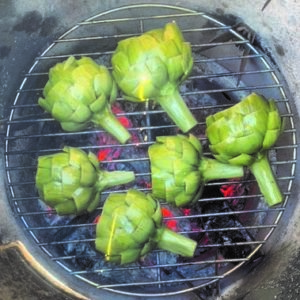There are some advantages to working in a vineyard. First, there’s the wine, though not until 5 p.m. Because I’m working. And, at this vineyard, there’s a food truck at hand for lunch. Then, there’s the view. I sit at my little desk and look out on the undulating rows of vines that run across the rolling landscape.
To be clear, I’m not planting vines or squashing grapes or anything like that. I’m not so much working in the vineyard as at it. This year has seen me working from all kinds of locations, as friends and neighbors have thrown open their doors to welcome me and my laptop.
The reason for my peripatetic pandemic work life is, in a word, Comcast. Like so many other parts of rural America, our stretch of Old County Road is scorned by the communications giant as not profitable enough to merit service. For 14 months, I’ve relied on the kindness of others to continue to work with my patients remotely. I’m a psychologist.
An early spring host was Truro Vineyards. “We have a spare room,” replied Kristen Roberts to the email plea I broadcast.
I can’t say exactly what Kristen does at the vineyard, except, well, seemingly everything. I’ve never not seen her delivering orders, directing guests, checking out customers, and receiving shipments. She seems to be everywhere at the same time. It was Kristen who set up a desk in the spare room on the second floor overlooking the vines so that I could take care of people.
One morning, I noticed workers pruning vines and piling the cuttings at the head of each row. My mind wandered to our travels in the Spanish province of Valencia and the paellas served to us there. In luxury versions, rice is combined with seafoods and meats. But before it appeared in restaurants, paella was farm workers’ food, made with green beans and snails or rabbit, and cooked over fires fed with vine cuttings, the smoke flavoring the dish.
Having been raised on south Louisiana jambalaya, I have a profound love for all kinds of rice preparations, and paella is one of my favorites. With big ideas and Kristen’s permission, I gathered up a load of thick dead trunks and smaller vines. The trunks will provide some staying power to the fire and the new growth an abundance of smoke to flavor anything grilled over them.
Once I got home, the idea of making a paella seemed like more than I wanted to take on. To put these gifts of the vineyard to good use without so much effort, I decided instead on a simple dish of grilled lamb chops and artichokes. I consulted my old reliable, Ruth Reichl’s Gourmet Cookbook, to find instructions for a rough chermoula, a sauce of oil, warm spices, and cilantro that I first tasted on a trip to Marrakech.
I marinated the chops for a few hours while I trimmed and steamed the artichokes until they were mostly done. Later, I would finish them over the fire while the grilled chops were resting. As a starter, I charred eggplant, peppers, and squash over the flames and then peeled and chopped the vegetables and dressed them with oil and the herbs I found poking up in the garden.
Preparing this food, I remembered vividly the sense of panic and powerlessness we felt as that first wave of the pandemic washed over us. It wasn’t clear to me how I could possibly help my patients “remotely,” and especially without good internet service. It was humbling to realize that I couldn’t solve this problem on my own, and that I would have to ask others, even strangers, to help me. And I would have to do it over and over again. It was surprisingly hard. The warmth and open-handed generosity of those who allowed me to take over their spare rooms for a while still takes my breath away.
There have been so many gifts this past year. Loaves and cakes left on our doorstep. Jars of hummus, homemade gravlax, and jugs of soup appeared over and over. Now, a trunkload of vine trimmings provided heat for our supper. But it’s the hospitality — the invitations to set up and keep working — that has affected me most deeply.
As Christopher and I sat down to lamb and artichokes, the scents of smoke and cumin and coriander reminded us of past travels. But that dinner grilled over grapevines awakened a different kind of recognition, too — that it was only because of our friends and neighbors that we made it through this upside-down year.
Grilled Lamb Chops in Chermoula Marinade

Serves 2
4 loin lamb chops
1 3-inch cinnamon stick
1 Tbsp. coriander seeds
1 Tbsp. cumin seeds
3 whole cloves
2 Tbsp. sweet paprika
½ tsp. cayenne
3 Tbsp. olive oil
1 Tbsp. garlic
2 cups finely chopped cilantro
Kosher salt
Break the cinnamon into a few pieces and grind it fine, along with the coriander seeds, cumin, and cloves in a coffee/spice grinder. Stir these freshly ground spices together with the paprika and cayenne in a small bowl. Mince the garlic and chop the cilantro fine.
In a large bowl, stir together the oil and garlic. Add the chops to coat, season them with salt, then dredge them in the spice mix.
Transfer the chops, any remaining oil and garlic, the spice mix, and the cilantro to a sealable plastic bag, shaking gently to distribute the ingredients evenly. Allow to marinate, refrigerated, for at least 2 hours or overnight.
When you’re ready to grill, bring the chops to room temperature while you prepare a medium-hot charcoal or gas grill. Lightly oil the grill rack.
For medium rare chops, grill for 4 minutes on one side, then 2 on the other. Remove the chops to a platter, cover with foil, and allow to rest for about 5 minutes.

Grilled Artichokes
Serves 2
2 large artichokes
1 lemon
Extra virgin olive oil
Salt and pepper
Chopped herbs (any combination of parsley, chives, basil, oregano, tarragon)
Fill a large bowl with cold water. Cut the lemon in half and squeeze the juice into the water (the acidulated water will keep the artichokes from turning brown). Pull off some of the tough outer leaves near the stem of each artichoke, trim the end of the stem, and peel it with a vegetable peeler. Rub the trimmed and peeled surfaces with the lemon halves.
Cut each artichoke in half from top to bottom and rub the cut face with lemon. Using a teaspoon or melon baller, remove the hairy “choke” at the very center of the thistle, and drop the halves into the water.
Fill a pot with enough salted water to cover the artichokes. Bring it to a rolling simmer, and then drop the artichokes into the water and cook until just tender, about 15 minutes. Be vigilant so as not to overcook them. Drain and cool artichokes.
While the chops are resting, rub the artichokes with a little olive oil, and put them on the grill, cut sides down. Grill until the halves are deeply marked by the grill and develop a well-browned mahogany color. Turn the artichokes and flatten a bit with a spatula. Grill until both sides are browned and dress with more oil, salt and pepper, and the herbs.



